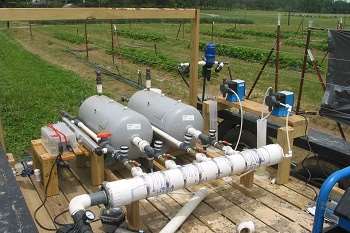
Faith Critzer, a food safety specialist with University of Tennessee Extension, will lead a new multistate research and outreach project to help fruit and vegetable growers mitigate the risks their water sources might pose to the safety of their produce.
This effort is made possible through USDA National Institute of Food and Agriculture’s Food Safety Outreach Program. The $522,000 grant was announced in October. Critzer and her colleagues at the University of Tennessee, Annette Wszelaki, a vegetable production specialist, and John Buchanan, a biosystems engineer, have joined with Extension specialists from New Mexico State University, North Carolina State University, the University of Florida and Virginia Tech. This team’s work will help growers understand and become compliant with the Food Safety Modernization Act (FSMA) produce safety rule.
“In our roles as Extension specialists, members of our team have received numerous questions and have had many discussions with growers who currently use surface water for irrigation or application of preventive sprays,” said Critzer. “The growers understand that surface water can become contaminated with microorganisms that can make people ill if consumed, also known as foodborne pathogens, and they do not want to rely upon monitoring via water testing, which only gives a snapshot of one period in time and may not detect intermittent problems that commonly arise with these water sources.” So to help the growers protect their produce, Critzer and the other team members are working to develop training that will equip them with the knowledge to successfully implement water treatment systems on their farms.
Specifically, the team plans to develop a curriculum to educate growers of all sizes and backgrounds about agricultural water treatment systems. Once developed, the Extension specialists will share their curriculum with other specialists who will then train growers. The team also plans to evaluate the short-term and medium-term outcomes that adoption of the curriculum and knowledge of the technology achieves in terms of improved compliance with FSMA regulations.
“Fruit and vegetable growers are concerned about the standards for water applied in the field during irrigation and in protective sprays,” said Critzer. “This curriculum, which will include hands-on demonstrations, should help growers understand the water quality standards and help them make educated decisions about how to use water treatment systems for this purpose and what systems may work best for their farms.”
Critzer and her team are very pleased to be tackling this project. “This funding addresses a need that has come directly from our clientele,” she said. “The growers are well educated. They know that foodborne pathogens can potentially come from the environment such as in run-off from rain and from wild and domesticated animals. They want to be proactive in protecting the crops they are growing, and most importantly, to protect the consumers who will be eating the produce with their families,” said Critzer.
The project team expects to develop the curriculum and begin initial “train-the-trainer” sessions over the next two years.
Through its mission of research, teaching and extension, the University of Tennessee Institute of Agriculture touches lives and provides Real.
Source:tennessee.edu